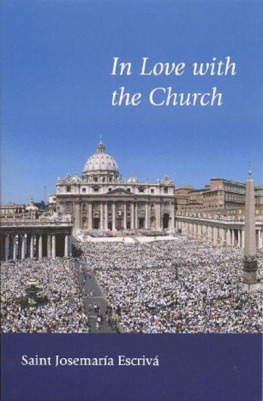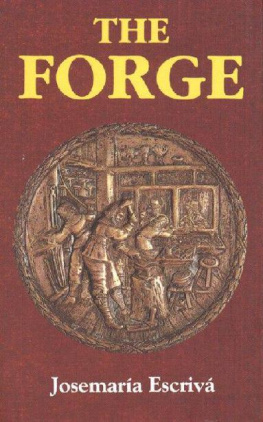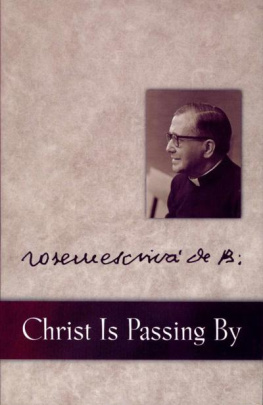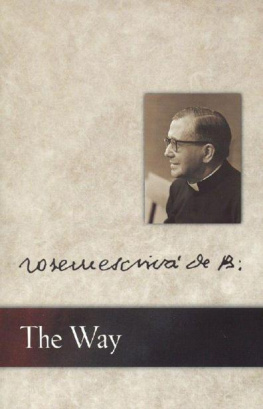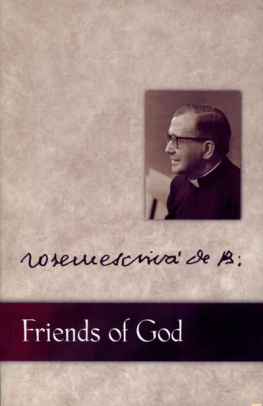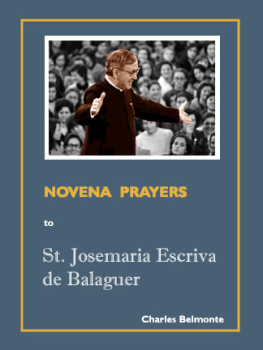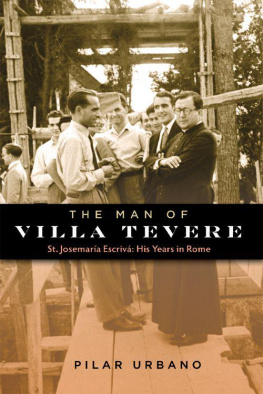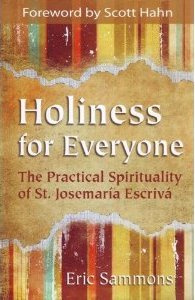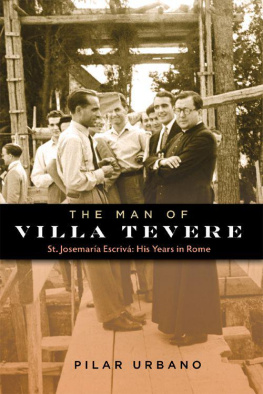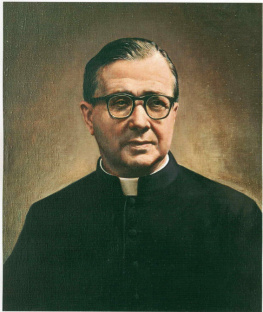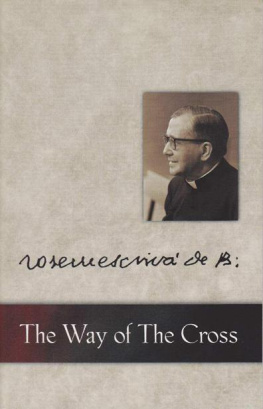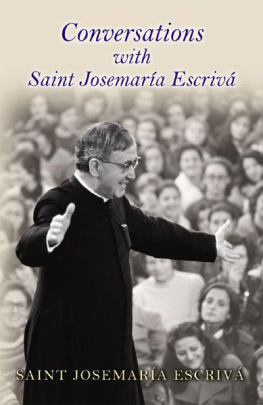St Josemaría Escrivá - In Love with the Church
Here you can read online St Josemaría Escrivá - In Love with the Church full text of the book (entire story) in english for free. Download pdf and epub, get meaning, cover and reviews about this ebook. year: 0, genre: Religion. Description of the work, (preface) as well as reviews are available. Best literature library LitArk.com created for fans of good reading and offers a wide selection of genres:
Romance novel
Science fiction
Adventure
Detective
Science
History
Home and family
Prose
Art
Politics
Computer
Non-fiction
Religion
Business
Children
Humor
Choose a favorite category and find really read worthwhile books. Enjoy immersion in the world of imagination, feel the emotions of the characters or learn something new for yourself, make an fascinating discovery.
- Book:In Love with the Church
- Author:
- Genre:
- Year:0
- Rating:4 / 5
- Favourites:Add to favourites
- Your mark:
- 80
- 1
- 2
- 3
- 4
- 5
In Love with the Church: summary, description and annotation
We offer to read an annotation, description, summary or preface (depends on what the author of the book "In Love with the Church" wrote himself). If you haven't found the necessary information about the book — write in the comments, we will try to find it.
St Josemaría Escrivá: author's other books
Who wrote In Love with the Church? Find out the surname, the name of the author of the book and a list of all author's works by series.
In Love with the Church — read online for free the complete book (whole text) full work
Below is the text of the book, divided by pages. System saving the place of the last page read, allows you to conveniently read the book "In Love with the Church" online for free, without having to search again every time where you left off. Put a bookmark, and you can go to the page where you finished reading at any time.
Font size:
Interval:
Bookmark:

In Love with the Church
SAINT JOSEMARA ESCRIV
In Love with
the Church

IN LOVE WITH THE CHURCH
Translated from Amar a la Iglesia (Madrid: Ediciones Palabra, 1986)
Translation, Introduction, Footnotes, and Indices are copyright
Fundacin Studium, Madrid, and are used with permission.
To learn more about St. Josemara Escriv and Opus Dei,
go to www.josemariaescriva.info and www.escrivaworks.org .
First English edition published 1989, Scepter Ltd., London
This edition copyright 2007
Scepter Publishers Inc., New York
www.scepterpublishers.org
All rights reserved
eBook ISBN 978-1-59417-107-9
Typeset in ITC Garamond fonts
Printed in the United States of America
Contents
In a homily preached in 1963, Monsignor Josemara Escriv recalled: When Pope John XXIII closed the first session of the Second Vatican Council and announced that the name of Saint Joseph was to be included in the canon of the Mass, a prominent churchman telephoned me to say: Rallegramenti! Congratulations! Listening to the Popes announcement, I thought immediately of you and of how happy you would be. And indeed I was happy, for in that conciliar gathering, which represented the whole Church brought together in the Holy Spirit, there was proclaimed the great supernatural value of Saint Josephs life, the value of an ordinary life of work done in Gods presence, and in total fulfillment of his will.
The universal call to sanctity
At the request of Pope John XXIII, and afterward of Pope Paul VI, I was called to work as president of the Commission on the Laity in the prepreparatory phase of the Council, and during the Council, as secretary of the Commission on the Discipline of the Clergy and of the Christian People, as well as consultant to four other commissions dealing with important doctrinal and disciplinary matters within the wide range of issues touched upon by the Second Vatican Council. While the results of the work of all these different commissions were being gathered together during the Councils final sessions, I frequently recalled that brief but significant telephone call. So often, in the course of approval of one Council document or another, it would have been a matter of perfect justice to turn to the founder of Opus Dei and to say: Congratulations! What you have lived in your own soul, and have untiringly taught since 1928, has been proclaimed, with all solemnity, by the Magisterium of the Church!
Going back in mind and heart to the days of the Council, I can single out two reasons, above all, that led me to say to our Lord: Gratias tibi Deus, gratias tibi (Thank you, O God, thank you!). The first of these was a vivid recollection from some thirty years earlier. At that time, while I was studying engineering, by the grace of God I received the vocation to Opus Dei, helped by the prayer, mortification, and example of its founder. He helped me to get to grips with my own conscience in a way that gave a new direction to my life as a Christian in the middle of the world, yet with no change of state whatsoever. A great impact was made upon me when I heard from his lips, or read in his writings, statements so simple and so tremendous as: We have come to say, with the humility of men who know themselves to be sinners and of little importance homo peccator sum (I am a sinful man) in the words of Saint Peterbut with the faith of persons who allow themselves to be guided by the hand of God, that sanctity is not something for a privileged few. Our Lord calls all men, and from all he expects love: from all, no matter what their state, their profession, or their occupation in life.
This doctrine of the universal call to sanctity was deeply felt in the heart of the founder of Opus Dei, and he repeated it continually, despite the possibility, or even the certainty, that those who had a narrow (some would say monopolistic) vision of the fullness of Christian life, might not understand him very well at all. From the beginning of the Work in 1928, he wrote some years ago, I have preached that sanctity is not something for privileged individuals. We have to make it known that all the paths of the earth, all states in life, all professions and honest tasks can be divine.
With the passing of time and through the generosity of the founder of Opus Dei, through his faithful correspondence to divine grace, these teachings have spread throughout the entire world. (By 1965, more than two million copies of The Way had already been printed in twelve languages.) Above all, they had become truths firmly implanted in the daily lives of hundreds of thousands of Christians who were either members of Opus Dei or in regular contact with the activities of personal formation organized by the Work.
Hence we can be assured that the Council was fully justified in saying in the Dogmatic Constitution Lumen gentium : It is therefore quite clear that all Christians in any state or walk of life are called to the fullness of Christian life and to the perfection of love.
The perfect correspondence of Monsignor Escrivs teaching with that of the Council documents, not only here but also in so many other points, is certainly obvious. I am a witness to the fact that it never passed through his mind to seek the recognition he meritedas so many eminent persons in the Church have already pointed out as being one of the great forerunners of the Second Vatican Council.
His untiring priestly zeal acted through his richly supernatural and human personality, which was so profoundly warm and communicative. It led him, in the course of more than fifty years as a priest, to deal with hundreds of thousands of persons of all ages and conditions who sought his spiritual counsel and assistance. Since the time of Opus Deis foundation, he had tirelessly received people singly or in groups. These groups were quite large at times, notably during his trips of catechesis (as he liked to call his work) through nearly all of Europe and the Americas. Besides these largescale get-togethers, there were many others as a constant feature of his daily life, in which non-Catholics and non-Christians from the most varied parts of the globe would come to see him in Rome, where he lived since 1946. I cannot say no, he would repeatwhile at the same time making sure, and at the cost of notable sacrifice, that this direct priestly work did not in any way jeopardize the other very direct priestly task of governing the Work, because he always discovered in his work, that of each moment, the duty of co-redeeming, of seeing souls.
I recall all this because, among the innumerable friends of Monsignor Escriv there were many bishops from various countries (Council fathers in those years of Vatican II) who benefited from the warmth of his priestly affectionso direct, cordial, and loyalas well as from the light of a deep interior life and vast pastoral experience. How many were the occasions (I can vouch for them, for I was present at those conversations) on which his life and experience shed light on grave doctrinal and disciplinary problems, all the while respecting with delicate reserve the workings of the Council.
This huge priestly capacity to give of himself (I cannot say no) was always accompanied by a careful effort to hide and to disappear , to avoid any of the multiple forms in which the subtle temptations of personal affirmation can disguise themselves, even in apostolic work. In 1934 he had written: To shine like a star the desire to be a high burning flame in the heavens? Better to be like a torch that burns hidden but igniting all that it touches. This is your apostolate; this is why you have been placed here on earth. Many years later, in 1975, when he was about to celebrate the fiftieth anniversary of his priesthood, he told us, his children: I dont want you to prepare a solemn affair, because I want to spend this anniversary in accordance with my usual practice: my role is to hide and disappear, so that only Jesus stands out. I cannot but confess that my heart was filled with joy, together with that serene sorrow which faith gives to those who have been separated from the ones whom they love, when I was able to reread in some of his early papers the same intention expressed in the very same words, written with quick and well-defined strokes: to hide myself and disappear.
Next pageFont size:
Interval:
Bookmark:
Similar books «In Love with the Church»
Look at similar books to In Love with the Church. We have selected literature similar in name and meaning in the hope of providing readers with more options to find new, interesting, not yet read works.
Discussion, reviews of the book In Love with the Church and just readers' own opinions. Leave your comments, write what you think about the work, its meaning or the main characters. Specify what exactly you liked and what you didn't like, and why you think so.

